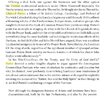davejonescue
Puritan Board Junior
Hello all. Was working on the Index when I came across this work by a person I never heard of, a Dr. Thomas Lushington. I seems to be there was some controversy regarding Mr. Lushington about forming or supporting Socinian views, so I didnt include him. But my main question is has anybody heard, or could point me to some info on a Puritan by the name of "Edmund Porter." In Dr. Lushingtons Wiki, it mentions him in the following "He experienced various attacks over the years accusing him of heretical opinions and socianianism, largely following comments by the "Puritan" Rev. Edmund Porter. His attacks would see Lushington return to Sittingbourne in 1655." I found out a little bit more about him online in a thesis entitled "“A Reception History of the Letter to the Hebrews in England, 1547-1685”, Kenneth Padley, Corpus Christi College, where it states the following:
"The 1640s were the tipping point for Reformed writers on Hebrews. No longer were they on the offensive against Catholicism. Instead they became reactive and defensive. Early rejoinders to the new challenges were aimed at shoring up individual doctrines, in particular the trinity and Chalcedonian christology. Chapter five considers the way in which two Reformed readings of Hebrews complemented the better known anti-Socinian polemic of Francis Cheynell and John Owen. Edmund Porter’s Theos Anthropophoros (1655) appreciated the integral connection between orthodox christology and soteriology but was limited in its effectiveness because of its tedious style and delayed publication."
But that is all I can really find about him. He has 4 works in EEBO-TCP, so I added them to the Index. Am looking for a little more light shed on him to make sure, but of what I see it looks like he would fall into the Puritan camp, if nothing else for being known as orthodox, and being in that time range, in that region. Also, what led me to search for him as he is being called a Puritan. But please, if anybody knows anything, let me know if its not too much trouble. He has the following works in TCP:
Christophagia, The mystery of eating the flesh and drinking the blood of Christ and the modus or manner thereof discovered / by Edm. Porter ...
Sabbatum. The mystery of the Sabbath discovered. Wherein the doctrine of the Sabbath according to the Scriptures, and the primitive church, is declared. The Sabbath moral, and ceremonial are described, and differenced. What the rest of God signified, and wherein it consisted. The fourth commandment expounded. What part of the fourth commandment is moral, and what therein is ceremonial. Something (occasionally) concerning the Christian Sunday. By Edm. Porter, B.D. sometime fellow of St John's Colledge in Cambridge, and Prebend of Norwich.
Theos anthrōpophoros. Or, God incarnate.: Shewing, that Jesus Christ is the onely, and the most high God· In four books. Wherein also are contained a few animadversions upon a late namelesse and blasphemous commentary on the Epistle to the Hebrewes, published under the capital letters, G.M. anno Dom. 1647. In these four books the great mystery of man's redemption and salvation, and the wayes and means thereof used by God are evidently held out to the capacity of humane reason, even ordinary understandings. The sin against the Holy Ghost is plainly described; with the cases and reasons of the unpardonablenesse, or pardonablenesse thereof. Anabaptisme, is by Scripture, and the judgment of the fathers shewed to be an heinous sin, and exceedingly injurious to the Passion, and blood of Christ. / By Edm. Porter, B.D. sometimes fellow of St. John's Colledge in Cambridge, and prebend of Norwich.
Trin-unus-deus, or, The trinity and unity of God ... by Edm. Porter ...
"The 1640s were the tipping point for Reformed writers on Hebrews. No longer were they on the offensive against Catholicism. Instead they became reactive and defensive. Early rejoinders to the new challenges were aimed at shoring up individual doctrines, in particular the trinity and Chalcedonian christology. Chapter five considers the way in which two Reformed readings of Hebrews complemented the better known anti-Socinian polemic of Francis Cheynell and John Owen. Edmund Porter’s Theos Anthropophoros (1655) appreciated the integral connection between orthodox christology and soteriology but was limited in its effectiveness because of its tedious style and delayed publication."
But that is all I can really find about him. He has 4 works in EEBO-TCP, so I added them to the Index. Am looking for a little more light shed on him to make sure, but of what I see it looks like he would fall into the Puritan camp, if nothing else for being known as orthodox, and being in that time range, in that region. Also, what led me to search for him as he is being called a Puritan. But please, if anybody knows anything, let me know if its not too much trouble. He has the following works in TCP:
Christophagia, The mystery of eating the flesh and drinking the blood of Christ and the modus or manner thereof discovered / by Edm. Porter ...
Sabbatum. The mystery of the Sabbath discovered. Wherein the doctrine of the Sabbath according to the Scriptures, and the primitive church, is declared. The Sabbath moral, and ceremonial are described, and differenced. What the rest of God signified, and wherein it consisted. The fourth commandment expounded. What part of the fourth commandment is moral, and what therein is ceremonial. Something (occasionally) concerning the Christian Sunday. By Edm. Porter, B.D. sometime fellow of St John's Colledge in Cambridge, and Prebend of Norwich.
Theos anthrōpophoros. Or, God incarnate.: Shewing, that Jesus Christ is the onely, and the most high God· In four books. Wherein also are contained a few animadversions upon a late namelesse and blasphemous commentary on the Epistle to the Hebrewes, published under the capital letters, G.M. anno Dom. 1647. In these four books the great mystery of man's redemption and salvation, and the wayes and means thereof used by God are evidently held out to the capacity of humane reason, even ordinary understandings. The sin against the Holy Ghost is plainly described; with the cases and reasons of the unpardonablenesse, or pardonablenesse thereof. Anabaptisme, is by Scripture, and the judgment of the fathers shewed to be an heinous sin, and exceedingly injurious to the Passion, and blood of Christ. / By Edm. Porter, B.D. sometimes fellow of St. John's Colledge in Cambridge, and prebend of Norwich.
Trin-unus-deus, or, The trinity and unity of God ... by Edm. Porter ...


